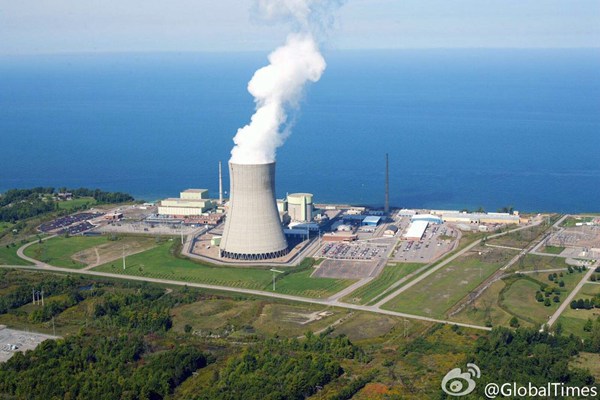

 |
| (File Photo/ Global Times) |
China's nuclear security law has been included in its legislation plan, which analysts believe would strictly regulate the booming industry, as well as provide legal grounds to maximize the energy structure.
"By coming up with a nuclear security law, public concern over nuclear security will be addressed and China's commitment to the international community will be fulfilled," Yuan Si, deputy head of the Environmental Protection and Resources Conservation Committee of China's National People's Congress (NPC), said at a press conference during the third session of the 12th NPC on Thursday.
Yuan's remarks come on the heels of a statement made by Nur Bekri, head of the National Energy Administration and deputy head of the National Development and Reform Commission, on Sunday that "there is no clear timetable for the construction of inland nuclear power plants."
"We are still carrying out extensive research and soliciting public feedback," said Nur.
A lack of a law on nuclear security in China is incompatible with its status as a nuclear state. The legislation will not only regulate the safe use of nuclear energy but also safeguard national security in a broader sense, He Zuoxiu, a theoretical physicist at the Chinese Academy of Sciences, told the Global Times.
"The new regulation may include rules to cope with terrorist activities against nuclear facilities, or to set up non-nuclear zones, where certain areas will be nuclear-free," He said.
"As China promotes low carbon energy to reduce pollution form coal-fired generators, the nuclear security legislation is timely, and can specify the requirements for building and running nuclear power plants," Zhou Dadi, vice director of the China Energy Research Society, told the Global Times.
The Chinese mainland operates 30 nuclear power-generating units with a total capacity of 28.31 gigawatts. 24 more units with a total capacity of 26.72 gigawatts are under construction, ranking first in the world, Xu Dazhe, director of the China Atomic Energy Authority, said at a press conference in January.
Zhou said the nuclear power plants account for only 2 percent of the country's total power requirements while the average global proportion is 14 percent, adding that China is in a great position to develop its nuclear projects.
The legislation may also curb the rapid expansion of nuclear power plants which has led to safety and public concerns, experts said.
The Chinese government put the brakes on nuclear power plant approvals after the Fukushima accident in Japan in 2011, calling for safety checks on nuclear power plants. Approval procedures were restarted in 2012 under pressure from increasing domestic demand for power.
 Beautiful Kapok flowers bloom in Hainan
Beautiful Kapok flowers bloom in Hainan Eye-catching beauties in Chunxi Road of Chengdu
Eye-catching beauties in Chunxi Road of Chengdu Wedding pictures of Wu Qilong, Liu Shishi released
Wedding pictures of Wu Qilong, Liu Shishi released One of world's largest military drills in Saudi Arabia
One of world's largest military drills in Saudi Arabia Iron lady or goddess? Sportswomen's dress show
Iron lady or goddess? Sportswomen's dress show Versatile female soldiers in military camp
Versatile female soldiers in military camp Top beauties in Chinese provinces
Top beauties in Chinese provinces Follow me to my Weibo
Follow me to my Weibo Chinese ships keep close watch on U.S. Navy aircraft carrier strike group in S. China Sea
Chinese ships keep close watch on U.S. Navy aircraft carrier strike group in S. China Sea Top 20 hottest women in the world in 2014
Top 20 hottest women in the world in 2014 Top 10 hardest languages to learn
Top 10 hardest languages to learn 10 Chinese female stars with most beautiful faces
10 Chinese female stars with most beautiful faces China’s Top 10 Unique Bridges, Highways and Roads
China’s Top 10 Unique Bridges, Highways and Roads An interview with the hottest player in Chinese basketball
An interview with the hottest player in Chinese basketball S. Korean TV series navigates China’s censorship blockade
S. Korean TV series navigates China’s censorship blockade US makes S.China Sea a flashpoint
US makes S.China Sea a flashpoint Video of boy falling out of moving van sparks discussion about use of child restraints
Video of boy falling out of moving van sparks discussion about use of child restraintsDay|Week